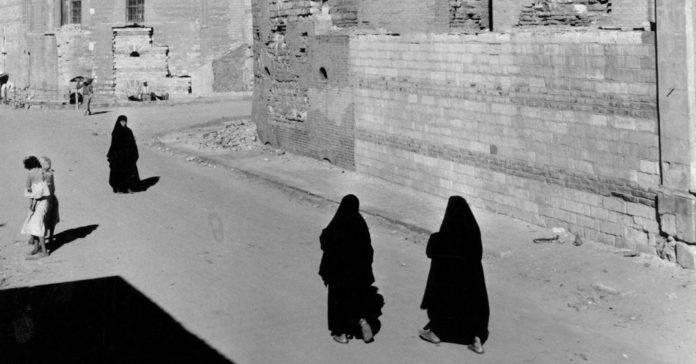“No entry,” said a man standing outside a nearby workshop.
As with the cemetery in Tunis, the gates of Bassatine were locked with a heavy chain and the graveyard was surrounded by a wall, this one at least 12 feet high. It was too high to climb, but along the far side I spotted a makeshift earthen ramp.
I was halfway up the ramp when someone started shouting at me from inside the graveyard.
“It’s closed,” he said, “the cemetery is closed.”
“I’m Jewish,” I shouted down.
Although his face softened somewhat, he still wouldn’t let me in.
“Talk to the rabbi,” he said, “you need an appointment.”
When I got home that afternoon, I tried in vain to find the rabbi who would grant me permission to enter. But it didn’t really matter. There are traces of Cairo’s Jewish past scattered throughout the city. They’re in the facade of the old Les Grand Magasins Cicurel department store, one of the many formerly Jewish-owned stores downtown. They’re hidden in the tomb of Saad Zaghloul, the beloved Egyptian nationalist, whose Jewish ally helped write the country’s first constitution. They’re in the produce stands selling molokhia, that quintessentially Egyptian vegetable also known as Jew’s mallow. They’re on the street, in the bootleg DVDs of golden-age Egyptian movies from the 1930s and 40s, featuring Jewish actors and producers like Najima Ibrahim and Togo Mizrahi.
Challah and Kolkata
For much of the 19th and 20th centuries, Kolkata was home to a thriving Jewish community, many of them emigrants from Baghdad and Aleppo drawn to the capital of the British Raj. The community included actors, politicians, bankers and journalists, as well as the famous model and actress, Pramila, who was the first Miss India in 1947. With the end of British colonialism and World War II, most of the community moved abroad, leaving behind a smattering of synagogues, cemeteries and schools, as well as a small hospital and a number of streets named after Jews.
I first heard about this history from a woman who happened to sit next to me on a flight from San Francisco to New York, whose distant relatives were caretakers of the city’s two most notable synagogues, Beth El and Magen David. This idea of a Muslim family looking after a synagogue after its congregants are gone stuck with me and was part of the inspiration behind my second novel, which revolves around a family of Muslim watchmen who guard the Ben Ezra Synagogue in Cairo. So, years later, when I visited Kolkata I asked a journalist friend about the watchmen, half expecting him to say it was all a legend. Not only was it true, he said, he had recently done a radio piece about the Jews of Kolkata. The synagogues were definitely worth a visit, he told me.
Source : Nytimes













